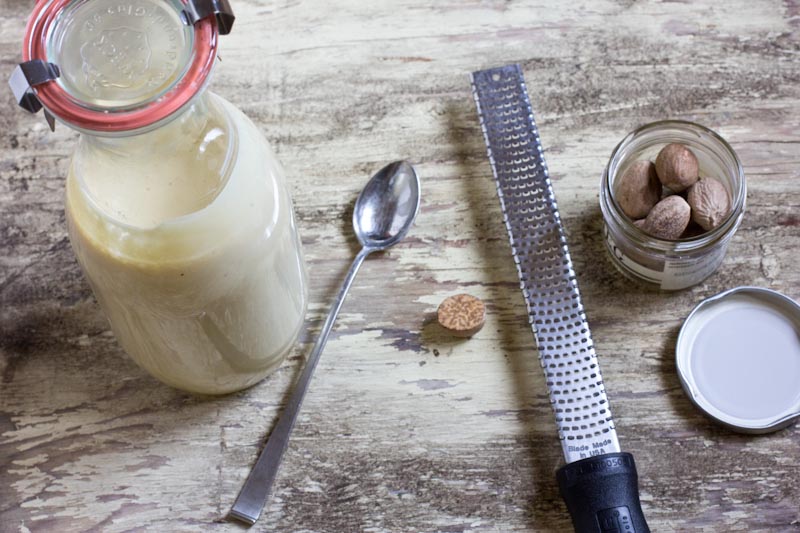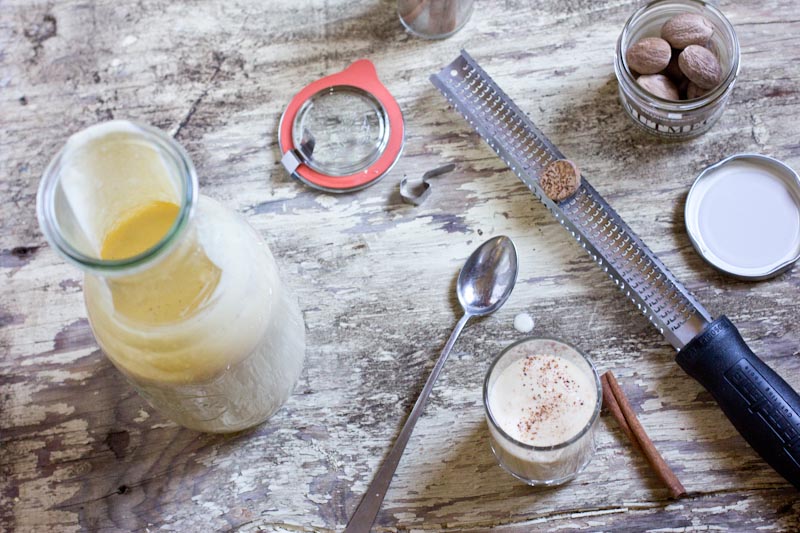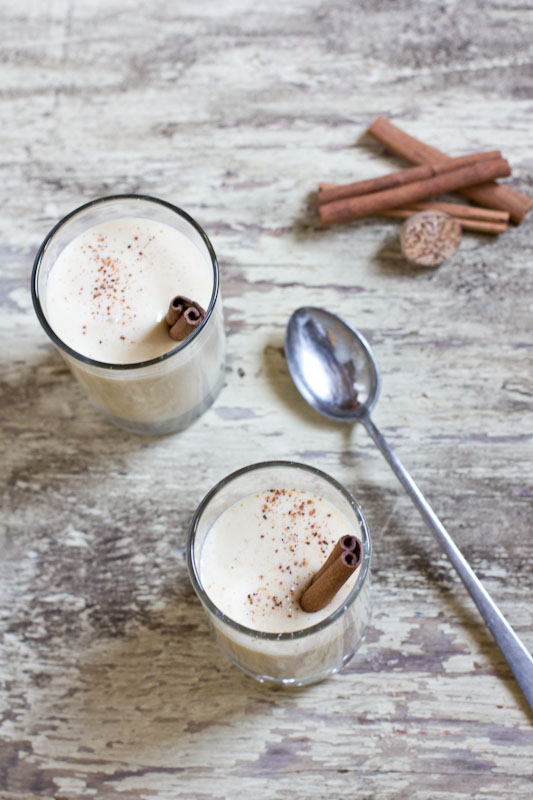It’s Eggnog season and either you love it or hate it. If you love it you may even drink it with Christmas morning breakfast, like my husband, but if you hate it you probably despise that there’s everything from eggnog cupcakes to eggnog lattes surrounding you at any given coffee shop, bakery, or foodie website. We love it so much that this year I tried making my own homemade eggnog recipe using kefir instead of cream in efforts to make it a bit more healthy. It was so easy to drink that the pitcher lasted only a few days.
If you’ve never heard of kefir, here’s my post addressing- What is Kefir? Simply put its a probiotic that’s even better for you than yogurt. You should try it and if you do feel free to use it in recipes as a substitute for buttermilk, cream, or whole milk. You can add it into smoothies, make pancakes or donuts with it, use it in cake, or enjoy it for breakfast with granola or muesli. I’ve even used kefir to make chicken salad.
Just because its the holidays doesn’t mean you have to stop eating healthy all together. It doesn’t mean you shouldn’t splurge either, but I find it best to meet somewhere in the middle. This kefir eggnog recipe perfectly balances the holiday decadent cravings with a little bonus of nutrition.
And it must be served with a cinnamon stick and a few sprinkles of freshly ground nutmeg!
Ingredients
- 2 1/4 cups Green Valley Organics Plain Kefir
- 4 eggs
- 1/3 cup sugar
- 1 tsp Bourbon Vanilla
- 1 tablespoon maple syrup (optional)
- nutmeg and/or cinnamon sticks for garnish
Instructions
- Whip eggs using a whisk or mixer. Mix the kefir, sugar, and eggs in a heavy sauce pan over medium-low heat. Cook for about 15 minutes, stirring constantly, or until mixture reaches 160 degrees to ensure eggs are cooked. The mixture should coat a a wooden spoon with foam. Pour mixture into a glass pitcher with a lid and refrigerate for 24 hours.
- Before serving, garnish with cinnamon stick or freshly ground nutmeg.








Looks delicious and sounds really interesting making it with kefir!
Aren’t the probiotic benefits of kefir destroyed with heating/ cooking?
I was wondering about destroying probiotic elements while heating too. There’s a way to pasteurize the eggs without adding it to the kefir and heating. I might try that. Just use egg yolks (egg whites cook too fast and you might end up with clumps of cooked egg) and whisk with 2 TBSP kefir for each egg. Heat in sauce pan on really low heat until it starts steaming and getting foamy. It should be pasteurized from the heat and then you don’t destroy the good probiotics heating it all togetherwith the kefir. Then just let the eggs cool off completely, add to kefir and refridgerate. I did this when I made a different eggnog recipe this past week that turned out amazing.
Thanks for the tip Melanie! I didn’t realize this when I made the recipe but I will be trying it your way next time!!
Hi! This looks awesome. I was wondering could I use greek yogurt instead of kefir? Maybe I would need to thin it out with maple syrup or water? Or not thin it out at all and see how it turns out?
What do you think?
🙂
Aidan, I’m honestly not sure about using yogurt instead. I think it would change the whole drink. Try kefir, if you haven’t before, I think you’ll like it!
Pasteurizing the mixture of course kills enzymes and other probiotics. With the proper ingredients this isn’t necessary. We’ve been making kefir smoothies which include raw egg yoke for many years, and we make our own kefir from raw organic milk. Our eggs come from our own pastured chickens who are healthy. Wouldn’t do this with store bought eggs. If you can find such eggs and want to try the recipe, be sure not to use the egg white. Eating raw egg white is not recommended.
Thanks for the tips Leonard. Yes, pastured eggs are the ones to choose if you’re ever consuming raw eggs. And if the eggs are pastured it is actually okay to eat the egg white too since the likelihood of salmonella is very slight then.